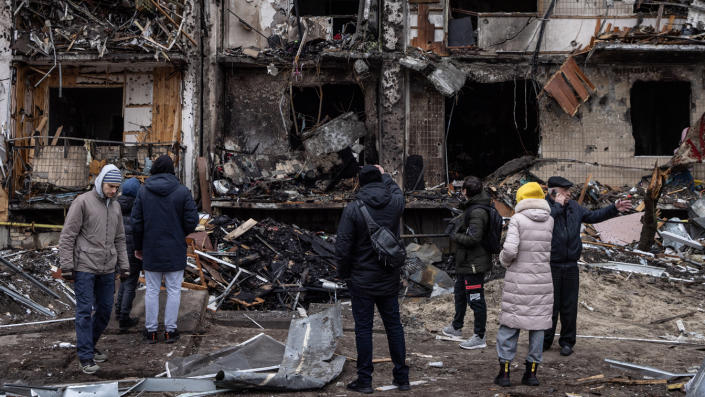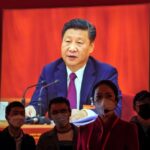Russia’s invasion of Ukraine earlier this year caused a massive flight from both countries. Russians fled to the West, not wanting to be associated with a war President Vladimir Putin seemed to launch for no credible reason. Ukrainians fled too, because bombs and rockets were falling on their towns and villages, killing the very people Russia was supposedly eager to “liberate.”
More than 30,000 refugees ended up in Israel, where an organization called Early Starters International offered their children early education classes. Hundreds of Ukrainian families accepted the offer, not realizing that in some cases, their children would be taught by Russians who had fled the same war they had escaped.
“It’s not easy for me,” says Sophia Kurtik, one of four Russian teachers who now work for Early Starters nurseries in Israel or Eastern Europe. “Sometimes I’m meeting with some parents, and with them I feel it’s a big problem.”
Once, an irate father demanded to know why she was giving the children Russian flags. She wasn’t: The flags were French, distributed as part of an activity unrelated to war. But mistrust runs so deep that the father’s anger cannot be chalked up to confusion between the two somewhat similar tricolors.
“Of course, some of the parents, upon arriving to our centers, are apprehensive of having a Russian teacher — but we quickly see that we are all on the same side,” says Early Starters co-founder Sarah Wilner. “No one wants this war.”
Although Ukrainians and Russians do share deep religious, cultural and ethnic ties, the rupture caused by Putin’s invasion may take generations to heal. “I will never forgive Russia,” a Ukrainian poet wrote in spring, expressing a sentiment shared by many of his compatriots, many of whom do not make a distinction between the “good Russians” who oppose the war and the millions who endorse it.
That means that for Kurtik, every encounter with Ukrainian parents has the potential to become fraught, as she confessed to Yahoo News in a recent conversation. Most don’t, however. Incomprehensible geopolitical forces have led her to Israel, a country locked in its own existential struggle. As for the Ukrainian refugees, they went from one of the world’s two nations with a Jewish president (Volodymyr Zelensky is the first Jewish person to lead Ukraine) to the other.
Like them, Kurtik is outraged by the aggressive war Russia launched in February. She buys none of the reasoning Putin has offered about Kyiv’s fascistic tendencies, which only begs the question of why she and so many other sophisticated, savvy Russians didn’t denounce the procession of falsehoods earlier. After all, Putin’s initial invasion of Ukraine in 2014 was launched under similarly fictional pretenses, as was the 2008 invasion of Georgia.
“And don’t tell me these Russians didn’t have a choice,” Ukrainian journalist Veronika Melkozerova wrote in the Atlantic over the summer. “We’re the ones who didn’t have a choice. All they had to do was disobey orders, and refuse to take part in Putin’s ‘special military operation.’”
Myriad fictions and deceptions have sustained Putin’s power for two decades, with complicity from millions of Russian citizens who had been enervated by decades of Soviet rule. Desperate for better lives, they gave Putin free rein. Only with the current invasion of Ukraine did Russians like Kurtik come to fully grasp what Russia had become under his leadership.
“It’s heartbreaking,” Kurtik says of the war, noting that her own ancestry — like that of many other Russians — can be traced back to Ukraine. “I was hoping it would end immediately,” she recalls, imagining that Putin might be assassinated by a political rival.
But his grip on the Kremlin remained as firm as ever, with internal Kremlin dissent — let alone the possibility of a coup — virtually nonexistent. Nor did he appear to be rattled by the protests that broke out across Russia. About two weeks into the invasion, which was already showing serious signs of faltering, Russia passed a new law criminalizing “false information” — that is, honest reporting and open discussion — about what the Kremlin insisted on calling a “special military operation.”
Kurtik had not joined the protests, fearing repercussions from rough police tactics. But the new law proved too much. “I feel like it was the end of free speech in our country,” she told Yahoo News. “And I can’t live without free speech; I can’t raise my son without free speech.”
Which is why she gave up her psychology practice in Moscow and fled with her husband and son to Egypt and then to Israel, where she now teaches the children of Ukrainian refugees in a kindergarten run by Early Starters International.
She sees the work as a kind of duty — and also, perhaps, a kind of penance. “They were pulled from their homes, from their families. Their fathers are still in Ukraine,” Kurtik says of her young charges, of their desperate need for normalcy in a deeply abnormal world. “It’s very meaningful for me to be there with the kids, to hear their stories, to listen to them, to play with them, to help them to process, somehow, this trauma.”
Wilner, the Early Starters co-founder, says that because Ukrainian men have mostly stayed behind, it is mothers who have had to manage the difficulties of life abroad, from housing to education. “The resilience I see in women is one that always amazes me, no matter where in the world,” she told Yahoo News.
Early Starters International had experience in offering early childhood education in the developing world; as soon as the scope of the conflict in Eastern Europe became apparent, the organization started early childhood education programs in Moldova and Israel. “As the war started, we felt the need to do something,” says Early Starters co-founder Ran Cohen Harounoff.
At the time, Israel was attempting a delicate diplomatic dance of showing support for Ukraine while not alienating Russia. Many felt that was not enough. “I think at the beginning, we were compensating a little bit,” Cohen Harounoff acknowledges. “As a second-generation Holocaust survivor — my mother was hidden by a Christian family in Holland — I felt obligated to do that,” he says of starting early childhood programs for Ukrainian refugees.
Of the many needs Ukrainians face, restoring a sense of normalcy for children is among the foremost. Their schooling had been disrupted by the coronavirus pandemic, then the war with Russia. “Schools in Ukraine are desperate for resources to build bomb shelters instead of playgrounds, with children being taught about unexploded ordnances instead of road safety. This is the stark reality for Ukrainian students, parents and teachers,” UNICEF head Catherine Russell recently said.
UNICEF also estimates that some 1.5 million Ukrainian children have been displaced by the war, meaning that many of them must begin school in another country, one to which they may have no genuine connection, whose language and culture may be utterly foreign.
“What we do comes from a very strong belief that children have a right to access an education,” says Wilner. “And it’s our responsibility as adults to provide it for them.”
Today, Early Starters runs seven early education centers in Moldova and six in Israel, with two now opening in Prague. Since the start of the war, some 3,500 children have received schooling and child care there, according to Wilner.
The centers are nurseries, utterly ordinary in every way except that the children who learn there are refugees. Kurtik says that the trauma of war is obvious, especially in the aggressive behavior of some boys, who have clearly internalized the military mood of early 2022, when the war began.
But there are also lighter moments. Wilner described how in early September she witnessed three girls returning to Early Starters after summer vacation, crashing into each other for a mirthful hug. “They just hung on to each other,” she says. “It was the most touching thing I’d seen in a long time.”




